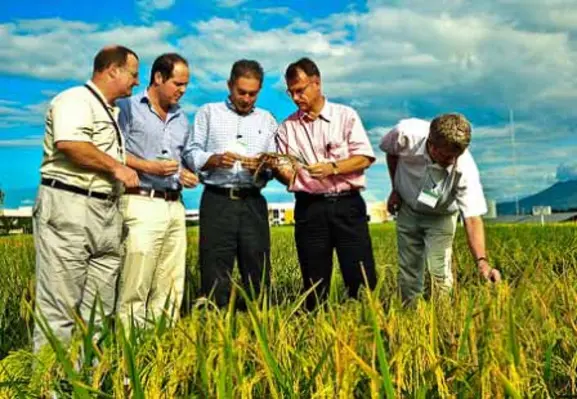Rice consumers worldwide can now look forward to eating “green” rice with the launch of an initiative that will set environmentally sustainable and socially responsible rice production management standards.
The “Sustainable Rice Platform” initiative, launched at IRRI headquarters in the Philippines recently, will elevate rice production to a new level by helping farmers–whether subsistence or market-focused–boost their rice production, keep the environment healthy, facilitate safer working conditions, and generate higher incomes to overcome poverty and improve food security.
“There are many different sustainable technologies and practices for rice – the world’s most important food crop that feeds half the planet,” said Mr. James Lomax, from the United Nations Environment Programme (UNEP) that initiated the Sustainable Rice Platform.
“The trouble is, we need a way to deliver and upscale these practices,” he added. “The Sustainable Rice Platform is an exciting opportunity to promote resource-use efficiency and sustainable trade flows in the whole of value chain of the global rice sector.”
The Sustainable Rice Platform will learn from established commodity initiatives that promote sustainability such as for sugarcane, cotton, and coffee, and apply them to rice. It will set sustainability targets, develop and promote regional and global standards of best practices for rice production, and support rice farmers to adopt these practices. It will also identify criteria to assess how well the sustainability targets are being met and whether farmers are implementing the practices.
“For example, we will harness our know-how to set standards to better manage insect pests in rice to reduce the unsafe and ineffective use of pesticides, which can damage the environment and the health of farmers,” said Dr. Bas Bouman, who will lead the work at the International Rice Research Institute (IRRI) – one of the project partners.
“We can also develop and promote the use of specialized field calculators to determine the environmental footprint of water, carbon, greenhouse gas emissions, or chemical use,” he added.
Rice presents a unique challenge for any quality control system because it is mostly grown by hundreds of thousands of poor farmers who have only very small farms of less than 1 hectare each. Moreover, 90 per cent of rice is grown in developing countries in Asia, where access to knowledge and support is limited.
“Our formula for success lies in our track record of working with rice farmers and others in rice research and development across the private and public sector at the international, national, and local level in major rice-producing countries,” Dr. Bouman said. “To create an impact in rice, we need to move forward in two directions: public policy development and voluntary market transformation initiatives.”
National government agricultural departments could explore and test management practices to make them nationally relevant and to promote them to rice farmers. Non-government organizations could help develop the sustainability criteria to safeguard or improve environmental health. Rice farmer, production, processing, or trade organizations and businesses could use the Sustainable Rice Platform to secure a premium rice market or higher prices.




